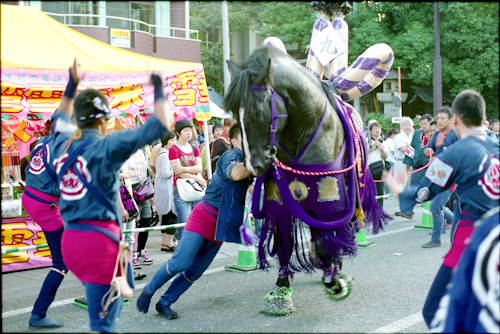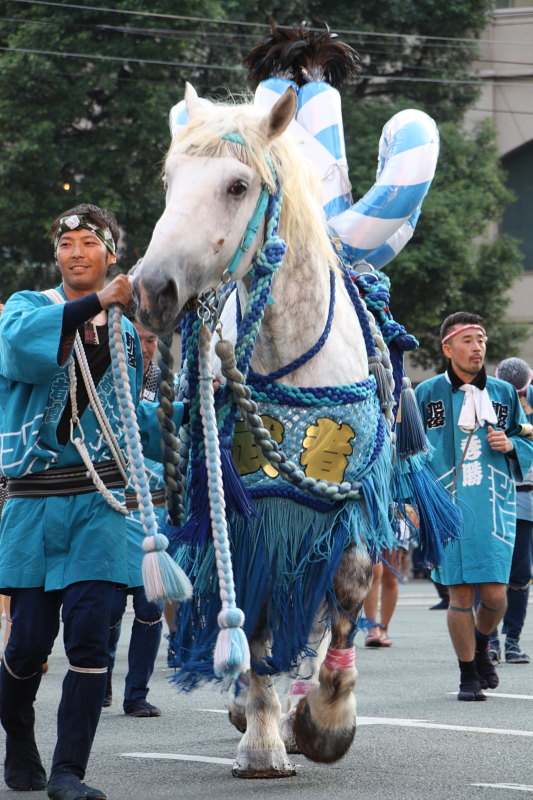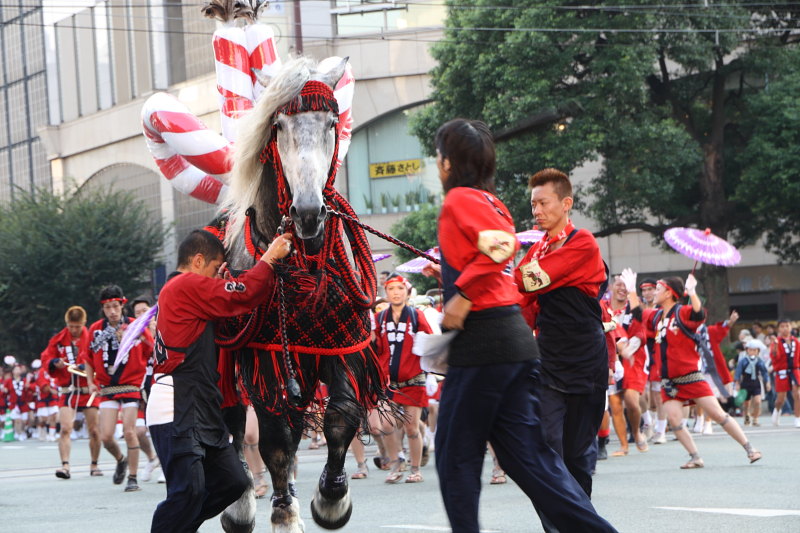 You may never have heard of Kumamoto's Boshita Festival, but it is one of the most popular events in our city.
You may never have heard of Kumamoto's Boshita Festival, but it is one of the most popular events in our city.
Also known as the Drunken Horse Festival, the Boshita Festival is believed to trace its origins to Hôjô-e (Pronounced Hôjô-ya in Fukuoka), a Buddhist ceremony, similar in some respect to Thanksgiving in America, in which animals are released into the wild. That said, nothing of the original ceremony remains in the present festival.
 The highlight of the festival is the Zuibyô Gyôretsu (随兵行列, parade of the samurai) which originated with the return of the daimyô Kato Kiyomasa from a military campaign to Korea (See Japanese invasions of Korea (1592-1598). Kiyomasa went to the Fujisaki Hachiman-gû Shrine to thank the gods for his men's safe return. This custom continued throughout the Edo Period, the decorations on the horses becoming larger and more ornate over time. Since the Meiji Restoration when the samurai class was abolished, the horses have been decorated by townspeople. Today, some 60 horses take part in the parade.
The highlight of the festival is the Zuibyô Gyôretsu (随兵行列, parade of the samurai) which originated with the return of the daimyô Kato Kiyomasa from a military campaign to Korea (See Japanese invasions of Korea (1592-1598). Kiyomasa went to the Fujisaki Hachiman-gû Shrine to thank the gods for his men's safe return. This custom continued throughout the Edo Period, the decorations on the horses becoming larger and more ornate over time. Since the Meiji Restoration when the samurai class was abolished, the horses have been decorated by townspeople. Today, some 60 horses take part in the parade.
Incidentally, the name of the festival Boshita comes from custom of shouting, "Horoboshita! Horoboshita!" (滅ぼした or 亡ぼした) "We destroyed the Korean army! We conquered Korea!" Not the most politically correct of names. Naturally, many resident Koreans took offence and since 1990 the festival has been officially, and more innocuously, called the Fujisaki-gû Aki no Reitaisai (The Fujisaki Shrine Autumn Procession). Ho hum.
The festival lasts for 5 days, culminating in the Zuibyô Gyôretsu which is held on the fifth and final day. Starting in the wee hours of the morning, Shintô priests lead the procession, followed by lion dances, people with portable shrines, and finally groups leading decorated horses through town.
 Team members dance wildly and shout, "Dô kai? Dô kai?" (How 'bout this? Whaddya think of this?) along the 30-kilometer parade route. Interestingly, each team gives their horses sake during the parade, getting the beasts nice and drunk. It is not uncommon for the horses to spook and crash violently into the spectators. Such fun!
Team members dance wildly and shout, "Dô kai? Dô kai?" (How 'bout this? Whaddya think of this?) along the 30-kilometer parade route. Interestingly, each team gives their horses sake during the parade, getting the beasts nice and drunk. It is not uncommon for the horses to spook and crash violently into the spectators. Such fun!
Do come to this festival if you are ever in the region.
Written by Bear Book, edited by Aonghas Crowe